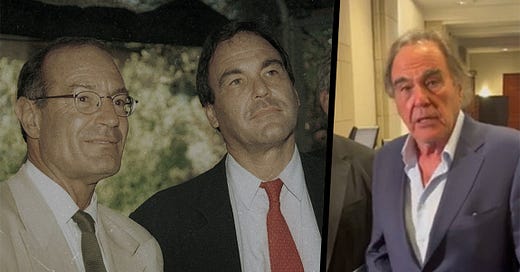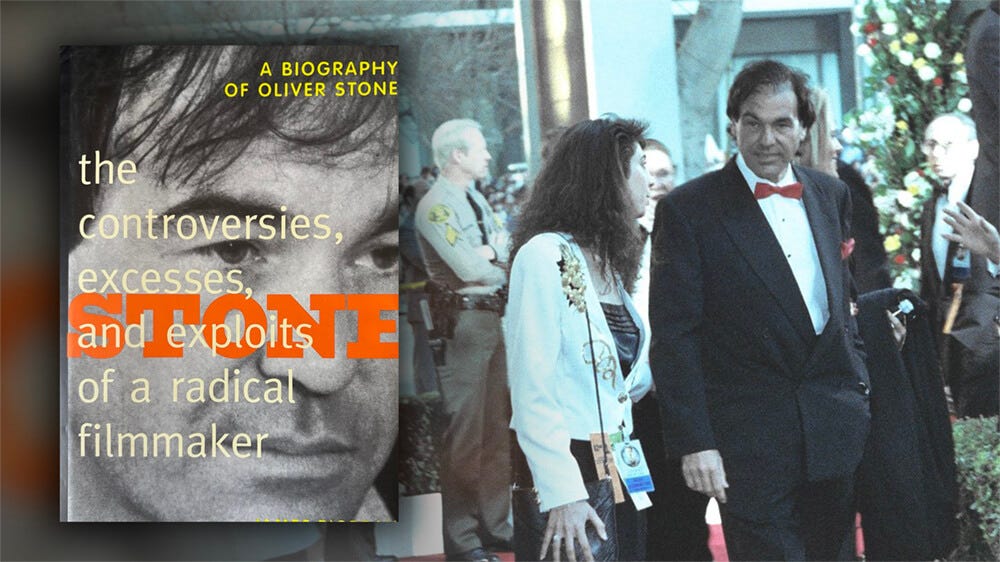Oliver Stone Questioned About Israeli Spy Executive Producing His ‘JFK’ Film
Movie mogul Arnon Milchan helped procure uranium and trigger devices on behalf of the very nuclear program that JFK was trying to stop
Earlier this month, a newly-formed House Oversight Committee task force held a hearing about the JFK assassination. One of the expert witnesses was famed American filmmaker Oliver Stone, who wrote and directed the 1991 film JFK.
Afterward, Stone and two other witnesses—
and , both authors and longtime researchers on this subject—took a few questions out in the hallway.Journalist
was on hand, and used this opportunity to ask Stone about Israeli billionaire Arnon Milchan, JFK’s executive producer.In addition to his career in Hollywood, Milchan, who recently turned 80, spent years working on another passion project: espionage on behalf of the Israeli government.
In fact, not only did Milchan spy for Israel; he specifically worked for (to quote The Guardian) “an Israeli agency that negotiated arms deals and supported Israel’s secret nuclear weapons project”—the very project Kennedy was working to stop prior to his assassination.
Sam has written about this previously, including in his 2023 article, “Israel and the Kennedy Assassinations.”
Here’s his Q&A with Stone about Milchan:
Transcript:
HUSSEINI: You, Mr. Stone, have talked in recent years about how Kennedy tried to prevent Israel from getting nuclear weapons. Now the executive producer of “JFK” the movie has said that he was a spy for Israel, and that he helped it procure nuclear weapons. When did you know that the executive producer on “JFK” was an Israeli spy?
STONE: After. Afterward.
HUSSEINI: When?
STONE: After I made the film.
HUSSEINI: When?
STONE: And he did not interfere in any way on the film. In fact, he was not the primary force. He came in as a partner with Warner Brothers. Warner Brothers was the one who was making the film with me. And, uh, I– they gave me f– they let me go to say what I had to say. So, Arnon Milchan came in, frankly, on the back side of the case. Didn’t express any opinions. And frankly, I knew he was an Israeli uh– let’s say a big shot in Israel, and he probably had some intelligence ties, but I didn’t know specifically what he had done.
A short while later, an audience member from the hearing, Karl Golovin, arrived at the press availability, and—having not heard Sam’s exchange with Stone—asked him a similar question (and received a similar answer).
Here’s a video:
Transcript:
GOLOVIN: The film “JFK” was produced by Arnon Milchan, who later confessed to being a spy for Israel, on their nuclear weapons trafficking. Mr. Stone in particularly, do you have any comments on that?
STONE: No, at the time we made the film I didn’t know this. This came out afterward for me. Um–
GOLOVIN: Do you think there’s any way he influenced the focus of the film…?
STONE: No because he came in on the back side of the film. Basically we were going– Warner Brothers was the main [proponent] for the film. They were the most important. I did what I want, and– with all of the research I had. Arnon played a financial role, and that was it. And it was very successful for him. And he went on to tremendous success.
Spying and Propagandizing
Milchan was born in 1944, and began working for LAKAM (aka Lekem), the Israeli intelligence agency responsible for nuclear espionage, in the 1960s, when he was still in his 20s.
By the mid-1970s, he had reportedly already “completed a number of important joint U.S.-Israeli projects in Iran” and was “handling a sizable portion of Israel’s defense procurements.” (He was “Israel’s foremost weapons procurer” for years, according to Los Angeles magazine.)
Milchan was then personally recruited by Israeli defense minister Shimon Peres—the future president and prime minister of Israel, who NBC News has described as “the architect of Israel’s nuclear program”—for a new covert mission: representing Israel in a secret alliance with the government of apartheid South Africa.
Many of the apparent details are laid out in the book, Confidential, The Life of Secret Agent Turned Hollywood Tycoon Arnon Milchan, written by Israeli-born journalist Meir Doron and his American-born brother-in-law Joseph Gelman, a former AIPAC consultant.
Both served in the Israeli military as young men, and they seem intent on framing Milchan as a crafty, heroic Israeli patriot, as opposed to a villain. Thus, despite the book’s explosive content—information that most people would likely find shocking and/or incriminating—it’s not exactly written as a “critical” exposé. It is, however, based on direct interviews with Milchan, Peres, and others, in addition to dozens of books, articles, and other public sources cited in its footnotes.
With that said, they describe part of the arrangement as follows:
Secretly, primarily through the services of companies established by Milchan, [Israel] would act as South Africa’s primary defense systems supplier, funneling millions of dollars for purchases from third parties and through direct sales of its own military industries. . . . Every imaginable weapons system needed by South Africa that could not be purchased directly from Israel was purchased on the international market, and instead of ending up in Israel as indicated on the final destination documentation, was diverted to South Africa. As with Israeli procurements, Milchan’s company quickly became the largest defense procurer for the South African government.
Besides “mortars, electronic surveillance equipment, anti-guerrilla alarm systems, night-vision equipment, radars, patrol boats, Bell helicopters, armored vehicles… howitzer artillery pieces… blueprints for its Kfir fighter jet,” and more, Israel—with Milchan as a key point man—provided something else to apartheid South Africa: critical nuclear components.
This reportedly included some 30 grams of tritium, which is used to increase the power of nuclear weapons—enough for as many as a dozen atomic bombs.
Another major part of Milchan’s job during that period: working with South Africa’s secretary of information Eschel Rhoodie and others on a “covert global propaganda campaign” to “attempt to influence world opinion in favor of the South African apartheid regime.” From Confidential (pp. 112, 117):
Their mission was to identify important opinion shapers in Western media and entertainment, such as journalist, cultural icons, and politicians, and target them for subtle recruitment to the South African cause through gentle persuasion, through bribery, or even by buying controlling interests in entire media outlets if necessary. . . . If there was one key financial facilitator in South Africa’s covert global propaganda campaign to improve the image of South Africa, it was Milchan. “I acted at the request of my own country,” Milchan told us.
On the other side of the equation, Israel’s “primary obsession in its relations with South Africa” was, per Gelman and Doron, uranium. “In exchange for military technology and covert public relations assistance from Israel, South Africa would open up an entire world of possibilities in defense contracts” to Israel, “plus access to its vast natural resources, especially uranium.”
Deals facilitated by Milchan and his fellow LAKAM operatives ultimately secured some 550 tons of uranium for Israel…. and South Africa’s help with an apparent undeclared nuclear test in 1979.
Meanwhile, “[Milchan’s] commissions on his South African deals… quickly became the largest source of his wealth—which would ultimately be parlayed into Hollywood blockbusters.”
And thus, for years, he led a double life: one as an increasingly influential figure in the movie industry, working with stars like Robert De Niro, and another as an Israeli spy working with his American collaborator Richard Kelly Smyth—who had set up a front company, Milco International, Inc., in nearby Orange County with Milchan’s help—to covertly “ship long lists of sensitive products to Israel… almost everything a country might need to turn itself into a high-tech, nuclear armed powerhouse.”
This included krytrons, devices that can be used as “sophisticated triggers for the detonation of nuclear bombs,” over 800 of which Smyth illegally shipped to one of Milchan’s companies in Tel Aviv between the years of 1979 and 1982.
“Israel basically built all their centrifuges to enrich uranium based on information that Milchan collected for them,” Doron added in an interview with CBS’s Carter Evans in 2013.
Evans: “So this information that the Israeli government used to build these nuclear centrifuges was obtained from his spying?”
Doron: “Yes, absolutely. Directly.”
“[Shimon] Peres… knew that [Milchan] was one of the most productive and creative operatives that Israeli intelligence had ever fielded. Over the years LAKAM chief Benjamin Blumberg, and later Rafi Eitan, presented him with long lists of highly sensitive items needed for Israel’s secret defense programs and other unobtainable defense-related materials, and through a sophisticated web of front companies around the world he delivered like no one else. Milchan’s mission was to secure these items by any means necessary – everything was fair game. In exchange, he would be treated as a prince among his people. . . . Rules that applied to others did not apply to Milchan; perhaps it was not a ‘license to kill,’ but very close to it.”
–Confidential, pp. 17-18
Executive Producing ‘JFK’
The question of how Milchan came to be the executive producer of JFK was addressed in some detail in the 1995 book, Stone: The Controversies, Excesses, and Exploits of a Radical Filmmaker.
“In this first full biography, author James Riordan has interviewed Stone, the actors who’ve starred in his films, and his family and friends, to assemble a complete portrait of Stone’s professional achievements and personal demons,” reads a note on the front flap of the book.
According to Riordan, Stone had met Milchan “years before” writing and directing JFK, and he was the “ace” that Stone had up his sleeve—and ultimately played— when he realized he’d need a lot more money for the film than the $20 million that Warner Brothers had initially committed to.
After explaining the origins of the project, the research that went into Stone’s writing of the screenplay, Stone’s deal with Warner Brothers, and his early attempts to court actor Kevin Costner to play Jim Garrison, Riordan writes on p. 364….
READ REST OF THIS ARTICLE FOR FREE HERE: https://decensored.news/oliver-stone-jfk-producer-arnon-milchan-israeli-nuclear-spy/
There are elements of this story, such as Getty image embeds, that Substack does not support—plus the full piece is too long to fit in an email. The story continues on the Decensored News website at the link above. It contains much more information and analysis, and additional clips of Sam questioning Stone, Morley, and DiEugenio about Israel and the JFK assassination.
If you enjoy this type of reporting, please follow Decensored News on multiple platforms, bookmark the website, and subscribe here on Substack:
Image credits: Ilana Baruch, Israel Press and Photo Agency (I.P.P.A.) / Dan Hadani collection, National Library of Israel (CC BY 4.0). Alan Light (CC BY 2.0).






